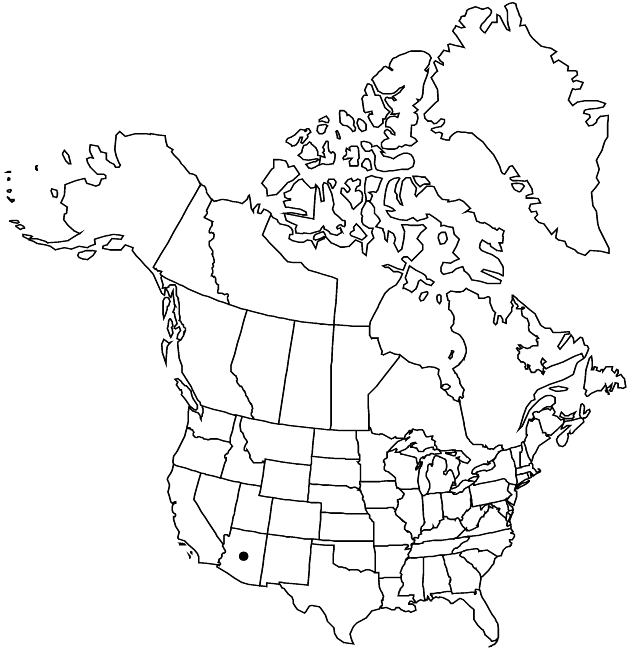Berlandiera monocephala
J. Arizona-Nevada Acad. Sci. 36: 8. 2003.
Basionym: Berlandiera lyrata var. monocephala B. L. Turner Phytologia 64: 205, fig. 1. 1988
Revision as of 22:04, 29 July 2020 by imported>Volume Importer
Plants 10–100 cm (taproots much thickened). Stems unbranched or branched near bases. Leaves crowded near stem-bases; petiolate; blades oblanceolate, rarely pinnatifid, membranous, margins usually crenate, faces velvety. Heads usually borne singly, rarely 2–3 together. Peduncles hairy (hairs whitish, matted). Involucres 15–35 mm diam. Ray corollas yellow, abaxial veins green, laminae 9–12 × 4.5–6 mm. Disc corollas yellow. Cypselae (obovate) 5–6 × 3–4 mm. 2n = 30.
Phenology: Flowering May–Oct.
Habitat: Grasslands on rolling hills, often with oak, pinyon, and juniper
Elevation: 1300–2100 m
Distribution

Ariz., Mexico (Chihuahua), Mexico (Sonora)
Discussion
Roots of Berlandiera monocephala are sold in local Mexican drugstores for stomach and lung troubles (B. L. Turner 1988d) and for insect or snake bites.
Selected References
None.
Lower Taxa
None.
"broader" is not a number.
... more about "Berlandiera monocephala"
green +
introrse +
connate +
herbaceous +
scarious +
absent +
hirsute +
papillate +
bristlelike +
continuous +
pinnatifid;oblanceolate +
membranous +
winged;ribbed;winged;ribbed +
1;15 +
stigmatic +
absent +
zygomorphic +
winged +
dimorphic +
staminate +
staminate +
straight +
velvety +
distinct +
proximal +
1;5 +
bisexual +
dispersed +
singly +
discoid +
singly +
indeterminate +
2;3 +
surrounding +
less campanulate;more or less hemispheric +
9mm;12mm +
4.5mm;6mm +
petiolate +
crowded +
deltate +
crenate +
2-carpellate +
inferior +
attached +
anatropous +
persistent +
fragile +
falling +
absent +
coroniform +
hairy +
tough +
thick +
absent +
connate +
persistent +
distinct +
falling +
J. Arizona-Nevada Acad. Sci. +
2003 +
pistillate +
absent +
fertile +
yellow +
paleate +
turbinate +
fibrous +
exalbuminous +
modifed +
2;3 +
alternate +
continuous +
2-branched +
papillate +
Berlandiera monocephala +
Berlandiera +
species +
shorter +
cylindric +
shorter to longer than campanulate +
perennial +